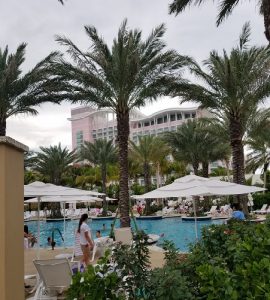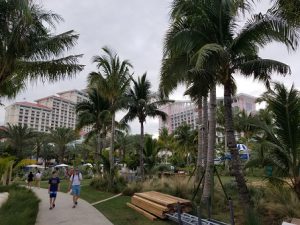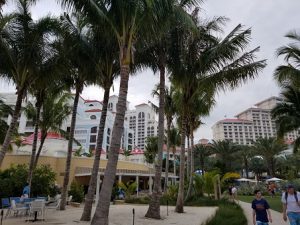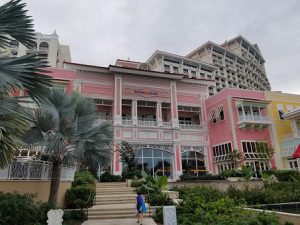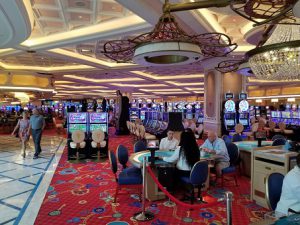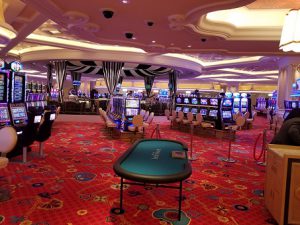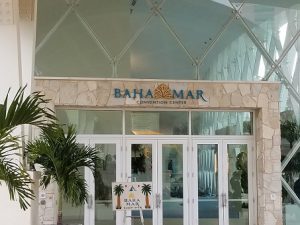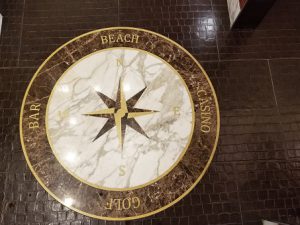A Nation in Chaos – The Solution: Part 1
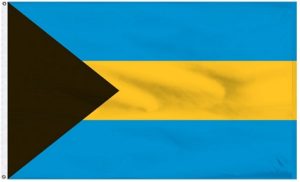
By: Stephen McQueen, BSc., PEd. – Preserving The Bahamas © 2019 – All Rights Reserved.
Scope of The Problem
The Bahamas is in chaos! We have challenges with income and expenses, assets and liabilities. While one notable problem is the high unemployment rate in the country among the native work force, another challenge is the newfound tax eco-system.
 Unemployment among Bahamians is still at an unacceptable level – 10.10% according to the last available official statistics. (Trading Economics, 2019) Foreign workers seem to have more work opportunities than do Bahamians – especially noted within the construction industry. While the new government of The Bahamas – elected in May 2017 – promised that their election to office would be the people’s time, we (the people) have been saddled with an increase in Value Added Tax (VAT) that now stands at 12%. This means that for every $100 spent by Bahamians an additional $12 must be paid to the government of The Bahamas despite possibly being one of the individuals fired upon the government taking office in 2017.
Unemployment among Bahamians is still at an unacceptable level – 10.10% according to the last available official statistics. (Trading Economics, 2019) Foreign workers seem to have more work opportunities than do Bahamians – especially noted within the construction industry. While the new government of The Bahamas – elected in May 2017 – promised that their election to office would be the people’s time, we (the people) have been saddled with an increase in Value Added Tax (VAT) that now stands at 12%. This means that for every $100 spent by Bahamians an additional $12 must be paid to the government of The Bahamas despite possibly being one of the individuals fired upon the government taking office in 2017.
This actuality became self-evident recent with the announcement of a new Foreign Direct Investment project near Freeport on the island of Grand Bahama, OBAN Energies LLC, an oil storage facility and oil refinery; (henceforth referred to as OBAN).
Furthermore, the OBAN deal was historic in its intent and in actuality – none of which reflected well on the leadership of our government and our people as a whole; the primary ‘deal breaker’ for OBAN signed a forged signature, and the nation’s chief was clueless about it. (Caribbean News Now, 2018) What’s more is that the deal seems to still be very much alive when it should have been banished entirely due to the glaring illegality of it all, and the forger should have been arrested and prosecuted as almost any Bahamian would have been for a similar crime.
In addition, illegal immigration continues to plague our country and the forces that support and demand the granting of citizenship to persons that have entered our land illegally and to their offspring have gathered their resources to ensure to the very best of their abilities that their end goal is successfully met. In a previous post entitled “The Constitution of The Bahamas – Is He/she a Citizen or Not?”, I asked lawyers to chime in and give their legal opinion so as to clarify any misunderstanding on my part, but not one lawyer responded – they were all amazingly “mum” on this crucial issue while Queen Counsel (QC) Fred Smith – legal advocate with a local Human Rights organization – continued his legal assault on the people of The Bahamas and while our government sat by seemingly dumbfounded concerning how or whether or not to respond. (Rolle, 2017) Seemingly as a consequence of the former, there are now illegal immigrants through social media bravely and brazenly accusing Bahamians of being hateful amongst other things.
This appears to be the classic strategy straight out of the feminists and LGBTQ playbook; it attempts to flip the script so that they are painted as innocents while others that stand for what is right are painted as evil thus placing righteousness on defense so that those who stand for God and country are so occupied with defending themselves that they do not have the wherewithal to focus on the real issues presented by evil and its forces. The script must be re-flipped so that evil is made to defend itself and not be perceived as right.
 Last, but by no means least among the challenges that define this Nation in Chaos, The Bahamas like other Caribbean nations, continues to experience the effects of illicit drug use/abuse and crime – violent crimes in particular. How many of our young men are now walking the streets “counting lamp poles” (street lights) because their minds have been lost to the use and/or abuse of some illicit drug? It is worth noting that the roots of our drug and crime problems – in practice – can be traced as far back as the bootlegging days when white Bahamians began taking advantage of the Prohibition era in America that was directly responsible for the accumulation of their wealth. (Saunders, 2003) The issues associated with today’s drug and crime “epidemic” cannot be relegated entirely to a modern Bahamas – to the “younger generation”; regrettably, these are the blossoms and trees from the seeds of yesteryear’s generation.
Last, but by no means least among the challenges that define this Nation in Chaos, The Bahamas like other Caribbean nations, continues to experience the effects of illicit drug use/abuse and crime – violent crimes in particular. How many of our young men are now walking the streets “counting lamp poles” (street lights) because their minds have been lost to the use and/or abuse of some illicit drug? It is worth noting that the roots of our drug and crime problems – in practice – can be traced as far back as the bootlegging days when white Bahamians began taking advantage of the Prohibition era in America that was directly responsible for the accumulation of their wealth. (Saunders, 2003) The issues associated with today’s drug and crime “epidemic” cannot be relegated entirely to a modern Bahamas – to the “younger generation”; regrettably, these are the blossoms and trees from the seeds of yesteryear’s generation.
How many more must be murdered before we realize and accept that we need to chart a new course – a different direction? What is that direction? The direction itself is not new but making the change will put us on a different path – one that leads to true success as a people that has rekindled its love for God.
For those that have kept silent when you should have spoken up with us, let the words of Dr. Martin Luther King Jr. ring loudly in your ear and deep within your spirit: “In the end, we will remember not the words of our enemies, but the silence of our friends.” (Good Reads, Inc., 2019)
——————
A Nation in Chaos – The Solution: Part 2
Simple but Multifaceted
The Way Forward is not complicated, but it does involve multiple layers and steps to achieve success. Those layers include spiritual realignment, ‘re-education’, self-economic empowerment and strategic alliances just to name a few.
Before we can address the solution properly, it is important to determine how the present state of our country came to be. As strange as it may appear to the younger minds, there was a time in The Bahamas when seeing an ambulance on an emergency run was big news and being part of nearly 100 persons running for several blocks and even into another neighbourhood to see a fire truck put out a fire was sad but seriously exciting at the same time. I recall a time when neighbours actually knew each other beyond a glancing smile – when we hung out on each other’s ‘porch’. We were friends and the relationships felt as though we were all family; we were a village raising each other’s children. There was a time when hearing of a murder was “unheard of” and totally unbelievable. What changed for The Bahamas? We became a nation obsessed with the pursuit of wealth by any means necessary – we left God.
There is an aspect of Bahamian and by extension Caribbean life that greatly contributes to our current cultural disposition and is woven into the fabric of our society that seems often overlooked and provided a rite of passage even. While there has been some chatter about its impact, no serious debate or time has been given to examine fully its sociological impact upon our peoples and the correlation between it and crimes of passion, violent crime and share apathy toward educational development.
What is this powerful entity? Music.
A study in Jamaica revealed that adolescent females were far more likely to act upon the sexually explicit lyrics of dancehall songs than were their male counter parts. It concluded that:
There is a correlation between hard-core dancehall genre and the sexual and violent behavior of adolescents. (Crawford, 2010)
 The report deems the effects of such music upon adolescents as a public health concern. While this particular study focused only on the impact upon youth, it begs the question of how both the larger society within Jamaica, The Bahamas, Trinidad and Tobago along with other Caribbean islands are impacted by the same. Given that The Bahamas has a very heavy reggae and dancehall music culture, together with our own Rake ‘n’ Scrape and Junkanoo music as well as the influence of rap artists across our airwaves but more specifically the wide selection of songs by our local D. J.’s that are sufficiently sexually and in some instances even violently explicit, we should have cause for concern regarding the impact being had upon our own society through our various media houses.
The report deems the effects of such music upon adolescents as a public health concern. While this particular study focused only on the impact upon youth, it begs the question of how both the larger society within Jamaica, The Bahamas, Trinidad and Tobago along with other Caribbean islands are impacted by the same. Given that The Bahamas has a very heavy reggae and dancehall music culture, together with our own Rake ‘n’ Scrape and Junkanoo music as well as the influence of rap artists across our airwaves but more specifically the wide selection of songs by our local D. J.’s that are sufficiently sexually and in some instances even violently explicit, we should have cause for concern regarding the impact being had upon our own society through our various media houses.
There are many that would have us believe a relationship with God Almighty is nonsensical, still, they have no solution for the continued onslaught of death and destruction that leaves more than 100 persons ‘obitualized’ in the Thursday newspaper and eulogized yearly from near weekly murders. (Smith, 2019) They have no solution for the scourge of illicit drug use/abuse that continues to plague our communities. While reports, depending upon the system employed to interpret statistics, may not accurately quantify or qualify the crime rate of Caribbean nations and the Caribbean as a whole, it is clear that we as a region continue to grapple with reducing the commission of crime, and in particular violent crime. The complexity of crime analysis for the Caribbean region has also been noted:
“…the uneven distribution of the region’s population among countries, considerably complicates crime analysis. While there are 20 to 30 countries and territories in the Caribbean (depending on how they are counted) some 88 percent of the population is found in just five countries…” (United Nations and World Bank, 2007)
The report went on to state that as a result of the high diversity of the Caribbean and most of the population being situated in just a few countries, the smaller islands’ crime experience may differ from those of larger islands. It further affirmed that crime data is generally extremely problematic and that the Caribbean is an …
“excellent case study of just how deceptive they can be.” (United Nations and World Bank, 2007)
Moreover, the report states that the best source of crime data is retrieved through household standardized surveys that have their own complications, but even more complex are the official crime figures presented by governments since they are generally based on police statistics that do not reflect unreported crime that is suspected to be even higher. Additionally, the report warns that regional crime rate comparisons are even more complicated since under-reporting by countries cannot be appropriately gauged.
 Notwithstanding the diversity of the Caribbean and the challenges that accompany it, God provides us with solutions that if followed would greatly improve our communities and country as a whole. Consider for example these words in the revered Christian textbook, the Bible; here the Apostle Paul is paraphrased in this one text:
Notwithstanding the diversity of the Caribbean and the challenges that accompany it, God provides us with solutions that if followed would greatly improve our communities and country as a whole. Consider for example these words in the revered Christian textbook, the Bible; here the Apostle Paul is paraphrased in this one text:
Secularism does not solve moral issues, but godliness solves both moral and secular issues. (1 Timothy 4:8)
How then does godliness solve the aforementioned issues? The Bible relates more, like at Proverbs 29:18 where it tells us that when the word of God is absent, people do whatever they feel like doing – they do what is right in their own eyes. When the word of God is honoured by a nation, then that nation begins to live in peace firstly, with God, and then with each other. They become a blessed nation. (Proverbs 14:34)
If you still think that spiritual realignment makes no sense, consider God’s position when the nation of Israel turned their backs on Him. In chapters 22 and 23 of the book of Jeremiah, God determined to punish wicked leaders that accepted bribes rather than carry out justice and that oppress the poor through burdensome taxation. He decided to punish the lying prophets and hypocritical priests as well – this demonstrates that God is not partial when it comes to righteousness; He will not only punish the ungodly but even those that profess godliness but secretly reject Him in their hearts. God had determined that He will literally kill not only the wicked but also their children will die in the streets and will also die in foreign lands.
Do we not see this every week in our own country? Do we believe that this is by pure chance because all of the wicked are not killed? The day of judgment will address all who remain whether they are wicked or righteous. He is not a God that shows favouritism when people refuse to live righteously. (2 Chronicles 19:7; Romans 2:11) This is what the word of God (the Bible) means when it says that sin is a reproach to any people – it means that sin shames and destroys our future while we live on earth, and if by some reason evil people escape a struggling future on earth, they will not by any means escape an eternal flame in the hereafter. (2 Peter 3:9-18) He is a God of both love and justice and love not only requires but also demands justice.
Remember the words of Dr. Martin Luther King Jr.:
… and there comes a time when one must take a position that is neither safe, nor politic, nor popular, but one must take it because it is right. (Reads, 2019)

Dr. Martin Luther King Jr. had it right on this issue because he recognized that “…injustice anywhere is an injustice everywhere.” (Reads, Good Reads Quotes, 2019)
——————
A Nation in Chaos – The Solution: Part 3
The Re-education Process
Notwithstanding the various types of education: academic, kinesthetic/hands-on, institutionalized and non-institutionalized, education remains the key component to an individual’s success and by extension, it remains the key component to a nation’s success.

According to Dr. Christopher Curry of the University of The Bahamas, “Ministry of Education is now emphasizing teaching skills rather than content. Mastery of content is much easier in technological age but learning how to think critically and developing certain skills requires more attention of educators.” Recent thinking by various professionals concerning education is not focused on ‘how smart one is’ but rather on ‘how one is smart’. This former school of thought (pun intended) suggests that some are smarter than others and therefore those ‘less smart’ may be relegated to lesser and perhaps even demeaning opportunities to make a better life while the latter school of thought suggests that everyone is smart but in different ways. Dr. Curry further noted that, “there is a general need to shift away from a liberal education curriculum (a vestige of colonialism) and develop more diverse curricula that address practical experiential learning grounded in Bahamian realities. Additionally, there is a need to focus more on vocational training and practicums.”
Believing that one is smart in a way that is different from another provides for him or her to seek out options related to how he is smart and to specialize in those areas, thus, possibly creating new industries and greater financial security for the newly discovered demand.
Much has been made of the education or the ‘mis-education’ of black people usually in terms of colonialism upon us whether imposed by others historically or self-imposed in modern times and rightly so. In his book, The Mis-education of the Negro, Carter G. Woodson stated that the negro has been mentally conditioned to accept the power and control of the oppressor over him. Woodson further stated that “When you control a man’s thinking you do not have to worry about his actions. You do not have to tell him not to stand here or go yonder. He will find his “proper place” and will stay in it. You do not need to send him to the back door. He will go without being told. In fact, if there is no back door, he will cut one for his special benefit. His education makes it necessary.” (Woodson, 1933, p.5)
While the aforementioned view is often in some form or another levied against imperialism and Christianity, and despite my views to the contrary regarding its attack upon the latter, the concept is nonetheless valid. Think about it; absolutely nothing that one deliberately does has been done without firstly thinking about it – even when such actions appear to be spontaneous the subconscious mind is still at work. In the Bible – the revered Christian educational textbook – the Apostle Paul put it this way concerning the preaching of the gospel:
“Since we have the same spirit of faith, according to what has been written, I believed, and so I spoke, we also believe, and so we also speak.” – 2 Corinthians 4:13.
In other words, our actions are determined by our convictions, and our convictions are determined by our beliefs; our beliefs are determined by our choice of education, and by extension, the outcome of our lives is determined by the same. A valid question at this point becomes “What do you believe and why?” An equally important question is “Whom do you believe?” This second question is extremely valuable because what one believes is often determined by whom one believes. If one believes someone to be trustworthy while another is not, then the tendency will be to believe the words or case of the trusted party over the other person. Asked another way, both questions could be rolled into this one question: “Who or what informs your education and why?” As one considers the latter part of this question, one should also think about whether or not the education source is trustworthy, and for what reason or reasons might the source be providing the education. The late great Robert (Bob) Nester Marley had it right when he sang the words “Emancipate yourself from mental slavery…” to his famous song, Redemption Song. (Marley, 1992, Verse 2, Line 1)

The vestiges of colonialism inclusive of language, idioms and colonial-like buildings continue to outlast their Colonial era in the Caribbean – to the extent that we now find pleasure in preserving art, artifacts and some physical structures as glorified antiques of what for some was a savage representation of gross oppression. Perhaps one of the greatest and most persistent, stubborn relic from the Colonial era is our Commonwealth system of governance headed by Her Majesty, Queen Elizabeth II, and represented by our collective Governors General as Her Majesty’s official representative in Commonwealth nations.
An equally staunch representative pillar of this system is Her Majesty’s Privy Council – the highest court in most Caribbean Commonwealth nations – save for Britain itself. Since it appears that we cannot be trusted to justly govern and adjudicate ourselves, we must turn to “The Lords of Her Majesty’s Most Honourable Privy Council” (Wikipedia, Privy Council of the United Kingdom, 2019) – now known as The “Judicial Committee of the Privy Council” (Wikipedia.org, 2019) – for a final verdict/judicial position on any sufficiently crucial matter that may come before them. We as people of the diaspora continue to live with their potent effects, and they seem to keep us colonized. A joint report by the United Nations and the World Bank on Drugs and Crime for the Caribbean region notes the following:
“The area was colonized by Denmark, France, the Netherlands, Spain, the United Kingdom, and the United States, and each power left its mark on the language, culture, and politics of the areas it held. Some countries retain varying degrees of dependence on these powers.” (Bank, 2007)
It is perhaps abundantly clear that we cannot change the past nor reject the usage of all that has come to be – particularly language – we can however determine their power over our peoples going forward. Re-education must then take into consideration not only the intended outcome but also the environment as it currently exists for those affected.
What exactly is being purported or suggested as part of a re-education process?
In response to this very important question, there are at least several considerations to be had but they are not here put forth in any particular order of priority. The Bahamas must take into consideration a total overhaul of the system that has been inherited through past generations since we continue to produce only a “D” average nationally in our schools. As we journey onto a better educational path, Dr. Curry suggests that we “do away with standardized tests that do not accurately measure student performance…” We then, must be willing to acknowledge that the system that we cling to is not appropriate for our success, and in the words of Woodson, that the negro perhaps continues to “unconsciously contribute to their own undoing by perpetuating the regime of the oppressor.” (Woodson, Preface, 1933)
Thus, education for Bahamians, our Caribbean family and the diaspora must take on new meaning – it must mean more than imparting information designed only to equip us for noble yet menial jobs. It must be designed to produce creativity, innovation and genius at international levels that make us the envy of our region and world. It must be designed to make Bahamians world leaders in a global village not just economically but also morally. Dr. Curry further reminds us that “Education is the vehicle to social change.
 Our students are our greatest resource. We must invest through education in human capital.” (Curry, 2019) This investment in “human capital” must be designed to bring forth the very best for our Caribbean nations. There is no question that government can and should play the major role in the re-education of Bahamians, and the private sector must employ its vast resources in this effort as well since they stand to benefit greatly or suffer loss pending the educational standing of Bahamians – this sector is inclusive of non-Bahamian entities domiciled in The Bahamas. Government and private entities working in partnership could use ideas from Finland – the world’s #1 in education (Ijeoma, 2018) – as a starting platform.
Our students are our greatest resource. We must invest through education in human capital.” (Curry, 2019) This investment in “human capital” must be designed to bring forth the very best for our Caribbean nations. There is no question that government can and should play the major role in the re-education of Bahamians, and the private sector must employ its vast resources in this effort as well since they stand to benefit greatly or suffer loss pending the educational standing of Bahamians – this sector is inclusive of non-Bahamian entities domiciled in The Bahamas. Government and private entities working in partnership could use ideas from Finland – the world’s #1 in education (Ijeoma, 2018) – as a starting platform.
All things considered concerning any move of government to re-educate Bahamians, this re-education process must not be left to the government of The Bahamas or the private sector alone. Instead, we as individual citizens must seek to lead the way for our own success story. This can be done by seeking opportunities to expand our knowledge by using all freely available avenues and then those that are cost effective. As an example, websites such as https://www.codecademy.com/ and https://www.courses.com/education that provide free online courses can be a starting point in taking the initiative to better one’s self. Persons can also enroll and take advantage of our very own FREE Destination Success Mentoring Programme: https://www.facebook.com/pg/Destination-Success-351756121639670/about/?ref=page_internal.
Take back your life by taking responsibility for its outcome. The Bible tells us that wealth provides protection as does wisdom – the difference being that wisdom can preserve one’s life beyond the ability of wealth. (Ecclesiastes 7:12) The example of the people of Laish in Judges 18:7 and following demonstrates this very fact – that wealth provides a level of comfort beyond need but that without wisdom destruction is still possible. So, create a vision for your future and go for it, but do not leave God out of it – instead consult Him first and foremost and then go back and thank Him for the success experienced.
——————
A Nation in Chaos – The Solution: Part 4
Self-Economic Empowerment
It is said that one cannot speak of political independence without first having economic independence. Said another way, an old proverbs states:
He who has the gold makes the rules.
We see this reality play out from homes to businesses on a micro scale.
The individual that may be considered the “chief breadwinner” generally determines how much money goes toward those things required for operating a home; this includes bills, groceries and entertainment etc. Very little if any may be put towards savings and/or investment. From a business perspective, one’s boss or employer determines the job description that will accompany a salary.
 On a macro level, other governments or international financial institutions set rules and policies in place that the borrowing government must agree with in order to receive funds that may be critical to the sustenance, growth and development of an economy. According to Dr. Christopher Curry of the University of The Bahamas, “Historically, international monetary organizations lend developing or underdeveloped nations with a very high interest rate attached to the loan. For example, in the 1970’s Jamaica was crippled with debt when it borrowed a huge loan from the International Monetary Fund (IMF) at 25% interest rate. This led to wide scale inflation.” (Curry D. C., 2019) Banks determine the terms or conditions that must be met in order to approve or disburse a loan to the now “on the leash” borrower.
On a macro level, other governments or international financial institutions set rules and policies in place that the borrowing government must agree with in order to receive funds that may be critical to the sustenance, growth and development of an economy. According to Dr. Christopher Curry of the University of The Bahamas, “Historically, international monetary organizations lend developing or underdeveloped nations with a very high interest rate attached to the loan. For example, in the 1970’s Jamaica was crippled with debt when it borrowed a huge loan from the International Monetary Fund (IMF) at 25% interest rate. This led to wide scale inflation.” (Curry D. C., 2019) Banks determine the terms or conditions that must be met in order to approve or disburse a loan to the now “on the leash” borrower.
As with other nations, both small and great, The Bahamas seems caught in a tangled web of ever-increasing debt. According to a local report, the country’s national debt currently stands at approximately 8 billion U. S. dollars – an increase of some US$137 million for the first quarter of the 2018-2019 fiscal year which represents almost 70 percent of our gross domestic product (GDP). “As an aside, GDP gives a false impression of a country’s true economic status, especially in territories like The Bahamas where there is an extreme wealth gap between the ‘haves and the have-nots-. Foreign Direct Investment (FDI) and local wealthy elites mask the fact that the majority of Bahamians are living below the poverty line. (Curry D. C., 2019)” Curry’s statement appears supported by a report noted by the Nassau Guardian that demonstrates the inequality of wealth distribution in The Bahamas as the second highest in the Caribbean. (Robards, Report: Bahamas has second-highest economic and social inequality in Caribbean, 2019)
Few nations have successfully navigated themselves through the oceans of complexities that will steer their economies to a budget surplus, let alone a foreign reserves surplus. We, in the Caribbean, have been greatly challenged in becoming the masters of our own destiny, and in any number of matters, seem to have been deliberately hamstrung from excelling as a people both by internal as well as external forces. Following emancipation in 1838, The Bahamas fell victim to an economic system that has been described by a former govern as practical slavery:
Rather than a monopoly of land, the important elements in this elite’s economic and social control were a monopoly of the credit available to the majority of the population and the operation of a system of payment in truck. The credit and truck systems frequently left the lower classes in debt and, as a governor of the colony in the late nineteenth century remarked, in a position of “practical slavery.”
Dr. Gayle Saunders in her masterful work, Bahamian Society After Emancipation, states that the “…truck system…was a means of ensuring that the peasant farmers remained constantly indebted to the owners. In a similar way, the pineapple, sponge, fishing and boat building industries were also prone to such control.” (Saunders, 1994) The Caribbean as a region has also experienced this credit and truck system to varying degrees; in fact, we are continuing to experience this system even today in the form of mega loans from China that require our governments to grant work permits to hundreds if not thousands of Chinese workers that will repatriate those funds to their state-owned companies while we repay both the loan and associated interests on monies that our governments never truly receive. Through this system, Caribbean governments and our people gain capital works and an exponentially swollen debt without any real economic expansion because our people receive comparatively little employment opportunities with such projects since the labour force is always largely imported as part and parcel of the “new deal.”
This “new deal” is exactly the kind of country manipulations by mega multi-national corporations with their governments’ approval and overt assistance in economically enslaving vulnerable nations within the Caribbean and as far away as Africa and the Middle East and was exposed by John Perkins in his best seller book, The New Confessions of an Economic Hit Man.
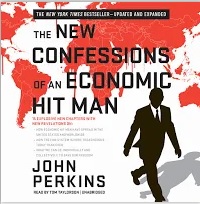
We, as a region, are not likely to achieve self-economic empowerment while allowing ourselves to be exploited through modern-day credit and truck systems that bind our economic engines and ingenuity to economic neo-Colonialism. Nonetheless, The Bahamas and the Caribbean region as a nation and a people respectively must seek and develop ways together that will lift us to loftier heights that hold our governments accountable to our people and greatly mitigate against internal and external forms of exploitation for our growth and development. “Banks and other lending institutions both locally and internationally have essentially replaced the old Bay Street oligarchs as the new lender and perpetuator of debt dependency” notes Dr. Curry. (Curry D. C., 2019) The “Bay Street oligarchs” are the mercantile elites that controlled the city of Nassau on the island of New Providence in The Bahamas and that exploited peasant farmers across The Bahamas, through the share and credit and truck systems that ensured the elites’ continued wealth and power over the local economy to the detriment of the average black Bahamian labourer.
 In retrospect, it seems little wonder that governments past and present have appeared reluctant to diversify the Bahamian economy. The oligarchs of Bahamian society have long had tourism as their “cash cow” as a direct benefit and development of bootlegging which gave them commercial and then political control of Nassau and by extension The Bahamas – a control that they still possess today. They, along with foreign investors, continue to be the prime benefactors of the tourism industry that’s replete with hotels and cruise ships that now develop and own entire islands in The Bahamas. (McCarthy, 2018) Meanwhile, the average Bahamian remain for the most part little more than a servile component of the Bahamian economic pie. (Saunders D. G., 2003)
In retrospect, it seems little wonder that governments past and present have appeared reluctant to diversify the Bahamian economy. The oligarchs of Bahamian society have long had tourism as their “cash cow” as a direct benefit and development of bootlegging which gave them commercial and then political control of Nassau and by extension The Bahamas – a control that they still possess today. They, along with foreign investors, continue to be the prime benefactors of the tourism industry that’s replete with hotels and cruise ships that now develop and own entire islands in The Bahamas. (McCarthy, 2018) Meanwhile, the average Bahamian remain for the most part little more than a servile component of the Bahamian economic pie. (Saunders D. G., 2003)
In order for The Bahamas and the Caribbean to achieve economic success, it is imperative for our citizenry to achieve the same as individuals. The reason that a democracy elects people to parliament is so that the government would better the lives of its people by representing through laws and policies, the will of the majority. In words attributed to Abraham Lincoln, a former president of the United States of America, “Government of the People, by the People and for the People should never perish from the face of the Earth.” (Wikipedia, 2019)
Given that the well-being of individuals is greatly and often directly tied to the state of one’s financial resources, it is imperative that Caribbean governments diligently seeks to financially empower each of their citizens through creative and innovative opportunities rather than burdening its them through onerous taxes such VAT, duty, excise and environmental taxes. Prosperity of the citizenry does not come through them being excessively taxed, nor does it come through the World Trade Organization (WTO) regulations that lead to an extraction of capital from our economies rather than an expansion for local markets through the non-discrimination clause imposed by the WTO upon participating nations since the Caribbean nations cannot compete in export to the global market.

If a government finds it necessary to tax its citizens beyond their ability to prosper, then the country will be an economic – and I dare say even a moral failure – a Failed-State. Consider the plight of Haiti with all of her natural disasters and complexities – according to Peter Hallward, much – if not most – of its plight is due to the deliberately punitive foreign and economic policies of the United States and some of its allies. Hallward asserts that an understanding of Haiti’s plight is incomplete without the historical backdrop of the United States as a former colonial and currently occupying power if only via the United Nation’s Peace Keeping Forces.
Whether we approve of the notion that the fiscal stability of a person affects their morality and by extension their attitude toward the commission of crimes, the reality is that a country is more at risk of experiencing unrests of all kinds when individuals cannot adequately or comfortably provide for their families. The Bible, God’s word, teaches us that when a country prospers, its citizens prosper also; so then, when citizens are not prospering, one can presume that the country may not be prospering (Jeremiah 29:4-5,7).
What then, does one do when a government fails to provide innovative and creative ways for its citizens to prosper?
Well, for starters, it’s past time for us to stop relying entirely on the government of The Bahamas to save our personal and local economies; we must now consider ways of monetizing ourselves through the internet. This may mean forming alliances/partnerships with both local and/or international investors. This can be done without having to establish what is commonly referred to in today’s Western society as brick-and-mortar businesses. The internet allows for billions of dollars to exchange hands without the business owner having or needing a physical establishment to conduct business.
The internet is the new vehicle for self-economic empowerment. In fact, the internet is the new economy. It is available to billions of people – many of whom have great financial resources and are willing, ready and able to spend on products that fulfills a need or desire in their lives. Many big-name brick and mortar business have shuttered under the weight of online businesses, or they have closed many store locations and released tens of thousands of employees. As a result of this Retail Apocalypse, entire shopping malls have closed because their clients have opted to shop online instead, and many more such business are expected to close in the coming year as online shoppers continue to multiply in number because of the convenience and safety of the online experience and the share exponential volume of increasing shoppers, i.e. Amazon . Of course, as with any business, the internet economy comes with its own risks, however, fear of the risks should not be allowed to prevent one from becoming economically empowered.
One of the great things about the internet economy is that a democratically elected government is bound to play by a new set of rules that generally favours the individual over the government. What we want: “At the end of the day we want to live an autonomous life — free from institutions or agencies that provide unnecessary encumbrances to economic freedom.” (Curry D. C., 2019)
At times, governments can seem to have greater obligations to align with entities unbeknown to the common person. In his book, The New Economic Hitmen, John Perkins states the he is:
“haunted by the ways in which that bank, its sister organisations, and I empowered…
corporations to spread their cancerous tentacles across the planet. I’m haunted by the payoffs to the leaders of poor countries, the blackmail, and the threats that if they resisted, if they refused to accept loans that would enslave their countries in debt…jackals would overthrow or assassinate them.” (Perkins, 2006)
If the above quotation accurately describes the plight of poor countries around the world, it is no wonder that the voices of the people could mean very little to politicians, and it may very well explain why some governments go ahead with otherwise foolish decisions that simply further economically enslave their citizens so much that they have little or no real hope of a recovery for centuries thereafter. If those statements are true, they make that much more important for persons to empower themselves financially rather than waiting for the government to do it.
With individual financial empowerment comes the ability to steer and drive one’s own economy, or at the very least, to have a genuine say in how it grows and develops. King Solomon put it this way, “Money answers all things (Ecclesiastes 10:19). In other words, our world today requires some form of currency to enjoy life, conduct business and create new opportunities; that currency is mainly money. It can be one’s own money or the money of an investor that has been leveraged to do business. In any case, money is required to build and control one’s economy, and trillions of it exists in various forms or expressions from the dollar bill to products, services and commodities.

We must allow our mind’s eyes to be opened so that any existing blindness can be removed. God tells us in his word that “He is the light of the world for salvation from sin, and that it is he who gives us the ability to acquire wealth, and in other cases, it is He who blesses us with wealth” – (Deuteronomy 8:18). For the Christian, our challenge is to avoid at all cost having a craving for wealth – we are not to chase after it (1 Timothy 6:9-11). In other words, we are not to be lovers of money; do God’s will, create and plan for financial success, but allow God to determine the outcome of that plan as we work it day by day. The idea is that believers should not pursue wealth as an officer of the law may pursue a criminal in a hot pursuit. Many believers have sold/lost their souls doing just that. I wish to borrow a medical slogan and apply it to our apparent financial and spiritual woes: “Be wise. Immunize.”
——————
A Nation In Chaos – The Solution: Part 5
The Need for Strategic Alliances
 Someone once said that “the enemy of my enemy is my friend.” In other words, those that have a common enemy might well find that they also have shared interests and can therefore be of benefit to each other in a common cause. Therein lies the concept of being allies. Miriam-Webster’s online dictionary defines the word ally as “a sovereign or state associated with another by treaty or league; a person or group that provides assistance and support in an ongoing effort, activity, or struggle; often now used specifically of a person who is not a member of a marginalized or mistreated group but who expresses or gives support to that group.” All of those definitions suggest that allies are connected by a common cause.
Someone once said that “the enemy of my enemy is my friend.” In other words, those that have a common enemy might well find that they also have shared interests and can therefore be of benefit to each other in a common cause. Therein lies the concept of being allies. Miriam-Webster’s online dictionary defines the word ally as “a sovereign or state associated with another by treaty or league; a person or group that provides assistance and support in an ongoing effort, activity, or struggle; often now used specifically of a person who is not a member of a marginalized or mistreated group but who expresses or gives support to that group.” All of those definitions suggest that allies are connected by a common cause.
For small island nations like The Bahamas, one wonders for what common cause if any should we ally ourselves with other nations? And, do we not already have allies in the Caribbean Community (CARICOM), Commonwealth Heads of Government (CHOGM), The Commonwealth, the United Nations (U. N.) and the Organization of American States (O. A. S.)? Notwithstanding the fact that I am largely unaware of the benefits of being involved with the above-mentioned communities, as a lay person, it appears that we may not be deriving the kind of benefit that The Bahamas truly needs for economic protection from much larger and far more economically and otherwise powerful nations. The U. N. provides peace-keeping forces, CARICOM is an economic body for the Caribbean, and the Caribbean Single Market and Economy (C. S. M. E.) is a regional agreement signed on by some Caribbean nations and is intended to strengthen member states’ economic power and stability. Dr. Christopher Curry of the University of The Bahamas believes that CSME will strengthen The Bahamas’ hand against the W. T. O. (Curry, 2019)

There appears to be a great push by the World Trade Organization’s (WTO) member states for The Bahamas to accede to the WTO, and our nation’s leaders seem “hell-bent” to do so irrespective of what seems to be compelling concerns on the part of most of the citizenry that are sufficiently courageous and adept at speaking to the issue and to what it may mean for our local economy, and by extension, The Bahamas’ sovereignty – the bigger picture. Little has been openly shared, let alone discussed with the wider public relative to how a WTO membership will affect the laws of The Bahamas in order to accommodate the current and new mandates that must be accepted with such a membership.
A fitting question is:
Why has our government sought to only present a one-sided perspective of WTO membership – that is the view that says we must join because we have no choice – rather than a complete view that shows both assets and liabilities?

Dr. Curry states that “the big issue with WTO from my perspective is the non-discriminatory clause. As such, it assumes all parties are on equal footing and have equal access to trade deals. It prevents regional tariffs and protective markets that are needed for small island states like The Bahamas.” (Curry, 2019)
The big players of the WTO have allied themselves to extract and pursue a course or path that is economically, politically and socially beneficial for their countries’ growth and development. Dr. Curry states it this way:
“They have created the guise of equality but operate in the context of profound inequality which they have authored and tailored to ensure their self-interests are maintained.” (Curry, 2019)
This means in part, that they will blacklist and penalize small nation states for monies that they believe ought to be repatriated into their coffers having branded us as tax havens – meaning we are not taxing their citizens that invest in our local economies so that we can send a portion of those taxed dollars back to WTO controlling-membership countries. The Bahamas, despite knowledge and evidence to the contrary, is said to have no natural resources. For the purpose of this paper, let’s presume that the aforementioned statement is true. Taken at face-value, if we have no natural resources (and many first-world nations have none either), nor have the technological advantages that first-world nations have, how else can we compete in this global village save for tourism and banking – both industries that are controlled by external forces? I might add that both are industries that can be crippled by the issuance of a “state department” warning to citizens of a first-world nation.
Dr. Curry states that the WTO’s “non-discriminatory clause would allow multi-national companies to bid on resources on equal playing field with Bahamian entrepreneurs.” The non-discriminatory clause does not level the playing field but instead removes the protection of small local business that do not have the resources nor the market access to compete with multi-national global corporations within our own local market. The evidence of this is already clear as it relates to Chinese imports and sale prices at much lower rates than local merchants can afford to compete against.
The position of “First World” nations toward small island nations like The Bahamas and the Caribbean wreaks of containment – a philosophy designed and intentionally carried out to prevent the growth, development and advancement of developing nations even after we have been pillaged for hundreds of years. According to Curry, “First, Second, Third World are social constructs devised by global north states to designate other states in a subordinate role to the ‘more advanced states’.” (Curry, 2019) It is a philosophy intended to prevent our nations from becoming global leaders and masters of our own destinies by subjugating our nations to rules designed for and by “first-world” nations for their greater benefit and the furtherance of their economies. For instance, and without any justification, and merely because it had the wherewithal so to do, “the Netherlands adds Bahamas to Tax Havens blacklist.” (Robards, 2019)
It is said that a WTO membership provides the legal framework to bind countries like The Bahamas to just such a thing among other even more sinister obligations. While it is our view that Bahamians should be entitled to the same preferential business treatment available to foreign entities within The Bahamas, The Tribune 242 online edition demonstrates that the European Union’s (EU) legislative demands are factual examples of how foreign bodies determine what, if any laws, are implemented in The Bahamas or Caribbean signees for or against our people. Neil Hartnell of Tribune242.com reported:
Brian Moree QC, senior partner at McKinney, Bancroft & Hughes, told Tribune Business that the elimination of such preferences was likely to prove “more challenging” than the European Union’s (EU) other demand for Bahamian-domiciled corporate vehicles to have “economic substance.” (Hartnell, 2019)
There is nothing democratic about EU obligations for Caribbean nations, and there is nothing about Hartnell’s report that reflects a sovereign Bahamas.
Clearly, the EU and the Organisation for Economic Cooperation and Development (OECD) have determined to make an example of The Bahamas for all and sundry that would dear stand up against their colonial and financial masters. The actions of the EU and the predicament of The Bahamas are consistent with the word of God that teaches: “The rich rules over the poor, and the borrower is slave to the lender.” (Proverbs 22:7) Below is yet another example of the EU’s ability to exert pressure and change laws in what should be a sovereign nation as tax laws and related fees in The Bahamas are being changed to comply with EU demands as reported by Eye Witness News: “In an effort to satisfy and comply with international tax standards outlined by the European Union (EU), some Bahamian business owners will experience a change in their annual business license fees this year, according to Peter Turnquest, Deputy Prime Minister and Minister of Finance.” (Sealy, 2019)
In his book, The New Confessions of an Economic Hit Man, John Perkins states that he worked for a large US corporation in which his role was purely “…to produce highly inflated economic forecasts… much of my job revolved around arranging huge loans that countries like Indonesia and Panama could never repay.” (Perkins, 2016) He further states that, “I had written papers, given lectures, and taken every possible opportunity to convince them of the importance of optimistic forecasts, of huge loans, of infusions of capital that would spur gross national product and make the rich much richer… It had required less than a decade to arrive at this point, where the seduction, the coercion, had taken a much more subtle form, a sort of gentle style of brainwashing.” (Perkins, 2016) The point here is that mechanisms are being used by those that have allied themselves to collude against small nation states such as The Bahamas in order to continually enslave us to financial debt and obligations that we may never be able to pay off for generations to come if ever. It is necessary that we as a nation seek out allies that also have the capacity to buffer us against losing those things that we hold most dear to our collective good and identity.
In a country with a judiciary that seems to pride itself on being independent of the government, where are your voices now? However, as Dr. Curry alludes, and rightly so, that they are not independent of the Executive. At a time when there appears to be an onslaught of external forces attacking the very foundation that you stand on – the law – why do you seem to distantly silent? Where are your voices when we as a people need you as internal allies to legally guide and challenge, if necessary, any and all actions of the government of The Bahamas along with any external forces that threaten our very democracy? Where are you now that we need you? This challenge of internal alliances is not only for the judiciary. There are many well-intentioned pro-Bahamas groups on social media; there is a grave need for us to band together in a deliberately, coordinated and thoroughly thought-through fashion so as to maximize benefits for our nation. At some point, marching in the downtown area must become insufficient in our move toward greater progress as a sovereign nation. Social media must not be relegated to an avenue merely for venting our frustrations. Rather, we must delve deeply into the mechanisms that produce the outcomes of our country and our world so that we through God become the true determiners of our destiny. At the very least, we must become allies in this fight for our nation’s identity, sovereignty and its future.
Again, in the Bible, in Luke 16:9, Jesus spoke of creating allies when he said, when he said:
Make to yourselves friends of the mammon of unrighteousness; that, when ye fail, they may receive you into everlasting habitations.
Paraphrased, Jesus is saying that believers must ally ourselves with unbelievers that are sympathetic toward our cause because despite the fact that they are not Christians, some share some of our values and even some of our hopes, dreams and aspirations, therefore, they will be willing to support our cause. It must be understood that Jesus is not teaching us to be friends with unrighteousness, but that we ought to learn how to live among the unrighteous without becoming unrighteous. The apostle Paul said that we cannot avoid unrighteous people as long as we live, but we must not be unrighteous in our own lives. (1 Corinthians 10:9-10) As a nation, we must seek out allies. We do not have to journey alone as a nation, and we do not have to “sell our souls” as it were to make progress.
There is another form of alliance needed by all Caribbean countries – one that is military in nature. It is obvious that individually and collectively we do not possess the capabilities required to protect ourselves and our very coveted resources – coveted both by corrupt leaders within and without as our histories amply demonstrate. When foreign forces can enter one’s borders, violate the legal framework and systems and be escorted out of country with impunity, then that country truly has grave national security issues that must be addressed forthwith and with the greatest of determination for a firm and actionable resolution. Haiti’s recent debacle of foreign nationals doing exactly the aforementioned may be ideal as a case study and also as a possible turning point for the better. (Watching The Hawks, 2019)
Armed conflict and war are to be avoided at nearly all costs, and having the capabilities to strike back at a severe threat may very well thwart “bullies” from “beating up on the little guy.” Unfortunately, Haiti appears to have been the weakest link in the chain of Caribbean little guys for centuries despite the fact that it was their strength that made them this continual target of bullies. (Wikipedia, 2019)
Shouldn’t the Caribbean have the inherent right to “stand your ground” without further bullying? Cuba has been embargoed for some 60 years (Wikipedia, 2019), and despite its strong ties with super powers like Russia and China, their plight has not significantly improved if at all.

Besides Haiti, the rest of the Caribbean, Africa and Middle Eastern nations have all been victims of ‘the Big Stick policy’ stated as “Speak softly, and carry a Big Stick, you will go far.” This policy was articulated and made popular by American president, Theodore Roosevelt. According to Wikipedia, “Roosevelt described his style of foreign policy as “the exercise of intelligent forethought and of decisive action sufficiently far in advance of any likely crisis.” “The idea is negotiating peacefully but also having strength in case things go wrong. Simultaneously threatening with the Big Stick, or the military, ties in heavily with the idea of Realpolitik, which implies a pursuit of political power that resembles Machiavellian ideals. It is comparable to gunboat diplomacy, as used in international politics by imperial powers.” (Wikipedia, 2019)
But without any formal, powerful allies that are prepared to step in and stop it, continual bullying by others and corruption from within, Haiti continues to be the economic punching bag and football of the Caribbean. (Autonomous Media, 2019)
How long will the rest of the world simply pay the people of the Caribbean nothing more than “lip service?” The powers that be will not stop paying the Caribbean lip service as long as we serve their greater purpose – human capital that builds their economies and nations instead of ours. Who dares to provide Big Stick diplomacy in protection of the Caribbean? Isn’t it time that we as a people look within and collectively raise ourselves to a better standing upon the world’s stage?
Despite anything and everything, our greatest ally must always be God. We must learn to trust Him, and He will direct our paths. (Proverbs 3:5-8)
————————–
About the Author
Stephen McQueen is a Bahamian that is professionally trained in the art of Public Speaking and Communication. He is the author of the 2006 USA Best Book Awards finalist, “You Can, I Know You Can!” that focuses in a very practical manner on daily being the best that one can be.
Mr. McQueen is a former Instructor of the Bahamas Technical and Vocational Institute in Nassau Bahamas where he has taught Public Speaking and English language at Basic, Bahamas Junior Certificate of Education (BJC) and Bahamas General Certificate of Secondary Education (BGCSE) levels. He is a graduate of Southern College, Nassau Bahamas with a Baccalaureate and Teaching Certificate in Primary Education.
 Mr. McQueen is also the author of When I Was Little © 2017, storyjumper.com and the Co-Publisher of Memories of The Beach, © 2017, storyjumper.com and Summer Times, © 2017, storyjumper.com. Additionally, Mr. McQueen is a certified Tour Guide of the government of The Bahamas through its Bahama Host program. Bahama Host is designed to professionally train persons to work directly in the tourism industry with regard to public relations. He is also a trained and licenced Marriage Officer with more than twenty (20) years of service in local and touristic weddings. His work with wedding ceremonies has been done at prestigious resorts in Nassau and other Bahamian Family Islands.
Mr. McQueen is also the author of When I Was Little © 2017, storyjumper.com and the Co-Publisher of Memories of The Beach, © 2017, storyjumper.com and Summer Times, © 2017, storyjumper.com. Additionally, Mr. McQueen is a certified Tour Guide of the government of The Bahamas through its Bahama Host program. Bahama Host is designed to professionally train persons to work directly in the tourism industry with regard to public relations. He is also a trained and licenced Marriage Officer with more than twenty (20) years of service in local and touristic weddings. His work with wedding ceremonies has been done at prestigious resorts in Nassau and other Bahamian Family Islands.
——————-
References
Autonomous Media. (2019, March). U. S. Marines Caught in Haiti. Retrieved from facebook.com: https://www.facebook.com/MediaAutonomy/videos/1014816648728131/
Bank, U. N. (2007). Crime, Violence and Development: Trends, Costs and Policy Options in the Caribbean. United Nations and World Bank.
Bibles, C. (2016). English Standard Version. In C. Bibles, The Holy Bible (pp. 1 Tim. 4:8, Prov. 29:18; 14:34, Jeremiah 23-24, 2 Chron. 19:7, Rom. 2:11). Wheaton, IL: Good News Publishers.
Bibles, C. (2016). English Standard Version Bible. In C. Bibles, The Bible (pp. 2 Cor. 4:13, Ecc. 7:12). Wheaton,IL: Good News Publishers.
Bibles, C. (2016). English Standard Version. In C. Bibles, The Holy Bible (pp. Jeremiah 29:4-5,7; Ecclesiastes 10:19; Deuteronomy 8:18; 1 Timothy 6:9-11). Wheaton, IL: Good News Publishers.
Bibles, L. (2009). King James Version. In The Holy Bible (p. Luke 16:9). Bellingham, WA: Logos Research Systems, Inc.
Bibles, C. (2016). English Standard Version. In C. Bibles, The Holy Bible (pp. Proverbs 22:7; Luke 16:9; 1 Corinthians 10:9-10; Proverbs 3:5-8). Wheaton, IL: Good News Publishers.
Caribbean News Now. (2018, March 23). https://www.Oban-energies-former-president-appears-for-town-hall-meeting-on-grand-bahama-oil-refinery-deal. Retrieved from Caribbeannewsnow.com: https://www.caribbeannewsnow.com/2018/03/23/oban-energies-former-president-appears-for-town-hall-meeting-on-grand-bahama-oil-refinery-deal/
Crawford, A. D. (2010, March 2). The effects of dancehall genre on adolescent sexual and violent behavior in Jamaica: A public health concern. Retrieved from National Center for Biotechnology Information: https://www.ncbi.nlm.nih.gov/pmc/articles/PMC3354427/
Curry, D. C. (2019, March 12). On Education in The Caribbean. Nassau, New Providence, The Bahamas.
Curry, D. C. (2019, March 20). The True Face of the Bahamian Economy. Nassau, New Providence, The Bahamas.
Curry, D. C. (2019, March 12). On The Need for Strategic Alliances. Nassau, New Providence, The Bahamas.
Fox Business. (2019). Retail Apocalypse: These big retailers closing stores, filing for bankruptcy. Retrieved from foxbusiness.com: https://www.foxbusiness.com/retail/features-retail-apocalypse-bankruptcy-stores-closing
Good Reads, Inc. (2019). Retrieved from goodreads.com: https://www.goodreads.com/quotes/11236-in-the-end-we-will-remember-not-the-words-of
Haar, B. t. (2016, July 9). Clingendael Magazine. Retrieved from clingendael.org: https://www.clingendael.org/publication/government-people-people-people#
Hallward, P. (2010, January 13). Our Role in Haiti’s Plight. Retrieved from theguardian.com: https://www.theguardian.com/commentisfree/2010/jan/13/our-role-in-haitis-plight
Hartnell, N. (2018, October 31). National Debt Grows $137M. Retrieved from tribune242.com: http://www.tribune242.com/news/2018/oct/31/national-debt-grows-137m/
Hartnell, N. (2019, January 3). Shocked If No Fight Over Tax Breaks End. Retrieved from tribune242.com: http://www.tribune242.com/news/2019/jan/03/shocked-if-no-fight-over-tax-breaks-end/
Ijeoma, C. (2018, October). facebook.com. Retrieved from Facebook: https://www.facebook.com/cijeoma1/videos/10156159342478743/.
Johnson, H. (2009, June 3). Comparative Studies in Society and History. Retrieved from cambridge.org: https://www.cambridge.org/core/journals/comparative-studies-in-society-and-history/article/modified-form-of-slavery-the-credit-and-truck-systems-in-the-bahamas-in-the-nineteenth-and-early-twentieth-centuries/B097CBE0F0E2F491346ABD0ACD2AA53D
Logos Research Systems, Inc. (2009). King James Version. In I. Logos Research Systems, The Holy Bible (p. Luke 16:9). Bellingham, W. A.: Logos Research Systems, Inc.
Marley, R. (. (2019). Redemption Song – Bob Marley and The Wailers. Retrieved from genius.com: https://genius.com/Bob-marley-and-the-wailers-redemption-song-lyrics
McCarthy, D. (2018, October 24). Disney Cruise Line Gets Approval for Second Bahamas Private Island. Retrieved from travelmarketreport.com: https://www.travelmarketreport.com/articles/Disney-Cruise-Line-Gets-Approval-for-Second-Bahamas-Private-Island
Perkins, J. (2006). The New Confessions. In J. Perkins, The New Confessions of an Economic Hitman (p. 1). Berrett-Koehler Publishers, Inc.
Perkins, J. (2016). The Deceptive Resume. In J. Perkins, The New Confessions of an Economic Hit Man (p. 147). Oakland, CA: Berrett-Koehler Publishers, Inc.
Reads, G. (2019). Good Reads Quotes. Retrieved from goodreads.com: https://www.goodreads.com/quotes/54247-there-comes-a-time-when-one-must-take-a-position
Reads, G. (2019). Good Reads Quotes. Retrieved from goodreads.com: https://www.goodreads.com/book/show/14349760-injustice-anywhere-is-injustice-everywhere?ac=1&from_search=true
Robards, C. (2018, May 2). National Debt Close to $8 Billion. Retrieved from thenassauguardian.com: https://thenassauguardian.com/2018/05/02/national-debt-close-to-8-billion/
Robards, C. (2019, March 22). Report: Bahamas has second-highest economic and social inequality in Caribbean. Retrieved from thenassauguardian.com: https://thenassauguardian.com/2019/03/22/report-bahamas-has-second-highest-economic-and-social-inequality-in-caribbean/?fbclid=IwAR0tPJ5qug6XwLzMAOK5Ge195rwZEWaKLJ3F3X5CGEPX2jQ5zQEorg6Uf8M
Robards, C. (2019, January 2). Netherlands Adds Bahamas to Tax Havens Blacklist. Retrieved from thenassauguardian.com: https://thenassauguardian.com/2019/01/02/netherlands-adds-bahamas-to-tax-havens-black-list/
Rolle, R. (2017, October 12). Smith Lashes Out at ‘Visionless’ FNM. Retrieved from tribune242.com: http://www.tribune242.com/news/2017/oct/12/smith-lashes-out-visionless-fnm/
Saunders, G. (1994). The Blockade Running Era in The Bahamas: Blessing or Curse? In G. Saunders, Bahamian Society After Emancipation (pp. 95, 96). Princeton, NJ: Markus Wiener Publishers.
Saunders, D. G. (2003). Prohibition. In D. G. Saunders, Bahamian Society After Emancipation (pp. 102, 104, 111, 112, 113). Princeton, NJ: Markus Wiener Publishers.
Saunders, D. G. (2003). The Changing Face of Nassau. In D. G. Saunders, Bahamian Society After Emancipation (p. 134). Princeton ,NJ: Markus Wiener Publishers.
Sealy, T. (2019, January 4). Change in Business License Fee Structure. Retrieved from eyewitnessnews.com: https://ewnews.com/change-in-business-license-fee-structure
Smith, S. (2019, January 2). 2018 murder count lowest in nine years. Retrieved from thenassauguardian.com: https://thenassauguardian.com/2019/01/02/2018-murder-count-lowest-in-nine-years/
Taylor, K. (2019, January 16). Retail Apocalypse. Retrieved from businessinsider.com: https://www.businessinsider.com/the-american-retail-apocalypse-in-photos-2017-3#as-customers-increasingly-shop-online-malls-are-suffering-the-consequences-2
Thomas, L. (2019, March 19). 74% of consumers go to Amazon when they’re ready to buy something. That should be keeping retailers up at night. Retrieved from cnbc.com: https://www.cnbc.com/2019/03/19/heres-why-retailers-should-be-scared-of-amazon-dominating-e-commerce.html
Trading Economics. (2019). Bahamas Unemployment Rate. Retrieved from tradingeconomics.com: https://tradingeconomics.com/bahamas/unemployment-rate
United Nations and World Bank. (2007). Crime, Violence, and Development: Trends, Costs, and Policy Options in the Caribbean. United Nations and World Bank.
Watching The Hawks. (2019, March). Watching The Web. Retrieved from facebook.com: https://www.facebook.com/watch/?v=313703612620743
Wikipedia. (2019, February 13). Privy Council of the United Kingdom. Retrieved from wikipedia.org: https://en.wikipedia.org/wiki/Privy_Council_of_the_United_Kingdom
Wikipedia. (2019, February 13). wikipedia.org. Retrieved from Wikipedia: https://en.wikipedia.org/wiki/Privy_Council_of_the_United_Kingdom
Wikipedia.org. (2019, March 8). Judicial Committee of the Privy Council. Retrieved from Wikipedia: https://en.wikipedia.org/wiki/Judicial_Committee_of_the_Privy_Council
Wikipedia. (2019, February 15). Gettysburgh Address. Retrieved from wikipedia.org: https://en.wikipedia.org/wiki/Gettysburg_Address
Wikipedia. (2019, March 18). Big Stick Ideology. Retrieved from Wikipedia: https://en.wikipedia.org/wiki/Big_Stick_ideology
Wikipedia. (2019, March 21). Haitian Revolution. Retrieved from wikipedia.org: https://en.wikipedia.org/wiki/Haitian_Revolution
Wikipedia. (2019, February 8). United States embargo against Cuba. Retrieved from wikipedia.org: https://en.wikipedia.org/wiki/United_States_embargo_against_Cuba
Woodson, C. G. (1933). Preface. In G. C. Woodson, The Mis-Education of the Negro (p. 4). Washington, D. C.: Tribeca Books.
Woodson, C. G. (1933). The Mis-Education of the Negro. Tribeca Books.
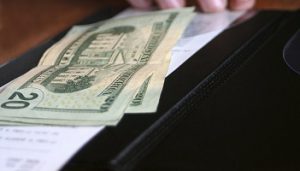 Unlike most places, the Bahamas mandates that restaurants charge 18% gratuity … even for take-out operations. This is extreme, as gratuity is universally accepted as remuneration for the Wait Staff. But when the mode of operation is “take-out”, gratuity is superfluous – there is no Wait Staff.
Unlike most places, the Bahamas mandates that restaurants charge 18% gratuity … even for take-out operations. This is extreme, as gratuity is universally accepted as remuneration for the Wait Staff. But when the mode of operation is “take-out”, gratuity is superfluous – there is no Wait Staff. The New Economy has brought forward a “Sharing Eco-System” in which industrial trends like ride-sharing, home-sharing and delivery assignments have emerged. There is now the concept of “ghost” restaurants – delivery services only; see details in the Appendices below.
The New Economy has brought forward a “Sharing Eco-System” in which industrial trends like ride-sharing, home-sharing and delivery assignments have emerged. There is now the concept of “ghost” restaurants – delivery services only; see details in the Appendices below.
Just ask anyone attempting to quit smoking. Not only are there physiological challenges, but psychological ones as well, to the extent that it can be stated with no uncertainty that “change begins in the head”. In psycho-therapy the approach to forge change for an individual is defined as “starting in the head” (thoughts, visions), penetrating the heart (feelings, motivations) and then finally manifesting in the hands (actions). This same body analogy is what is purported in this book for how the Caribbean is to embrace change – following this systematic flow:
 If you’re tuned into restaurant trends, you may have heard of ghost restaurants. These new types of foodservice establishments are increasing in popularity as more and more restaurateurs decide to depart from traditional brick-and-mortar establishments and focus on delivery instead. If you want to learn more about what ghost restaurants are, how they work, and how you can start a successful one, keep reading.
If you’re tuned into restaurant trends, you may have heard of ghost restaurants. These new types of foodservice establishments are increasing in popularity as more and more restaurateurs decide to depart from traditional brick-and-mortar establishments and focus on delivery instead. If you want to learn more about what ghost restaurants are, how they work, and how you can start a successful one, keep reading.
 (CNN) — Thanks to a $250 million transformation, Royal Caribbean’s once-sleepy private island retreat in the Bahamas is offering eye-opening
(CNN) — Thanks to a $250 million transformation, Royal Caribbean’s once-sleepy private island retreat in the Bahamas is offering eye-opening  In fact, in a
In fact, in a 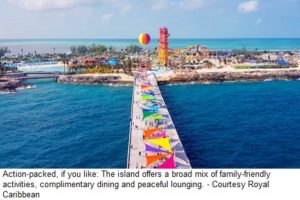




 … the Bahamas. – (See Appendix B below).
… the Bahamas. – (See Appendix B below).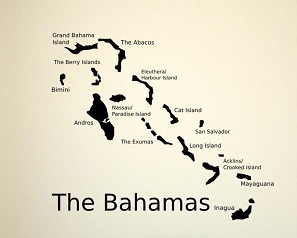 In the 60 years since, the Bahamas has made progress; sometimes
In the 60 years since, the Bahamas has made progress; sometimes  White Paper Title: A Nation in Chaos – The Solution Series – EXCERPT
White Paper Title: A Nation in Chaos – The Solution Series – EXCERPT


 Unemployment among Bahamians is still at an unacceptable level – 10.10% according to the last available official statistics. (Trading Economics, 2019) Foreign workers seem to have more work opportunities than do Bahamians – especially noted within the construction industry. While the new government of The Bahamas – elected in May 2017 – promised that their election to office would be the people’s time, we (the people) have been saddled with an increase in Value Added Tax (VAT) that now stands at 12%. This means that for every $100 spent by Bahamians an additional $12 must be paid to the government of The Bahamas despite possibly being one of the individuals fired upon the government taking office in 2017.
Unemployment among Bahamians is still at an unacceptable level – 10.10% according to the last available official statistics. (Trading Economics, 2019) Foreign workers seem to have more work opportunities than do Bahamians – especially noted within the construction industry. While the new government of The Bahamas – elected in May 2017 – promised that their election to office would be the people’s time, we (the people) have been saddled with an increase in Value Added Tax (VAT) that now stands at 12%. This means that for every $100 spent by Bahamians an additional $12 must be paid to the government of The Bahamas despite possibly being one of the individuals fired upon the government taking office in 2017. Last, but by no means least among the challenges that define this Nation in Chaos, The Bahamas like other Caribbean nations, continues to experience the effects of illicit drug use/abuse and crime – violent crimes in particular. How many of our young men are now walking the streets “counting lamp poles” (street lights) because their minds have been lost to the use and/or abuse of some illicit drug? It is worth noting that the roots of our drug and crime problems – in practice – can be traced as far back as the bootlegging days when white Bahamians began taking advantage of the Prohibition era in America that was directly responsible for the accumulation of their wealth. (Saunders, 2003) The issues associated with today’s drug and crime “epidemic” cannot be relegated entirely to a modern Bahamas – to the “younger generation”; regrettably, these are the blossoms and trees from the seeds of yesteryear’s generation.
Last, but by no means least among the challenges that define this Nation in Chaos, The Bahamas like other Caribbean nations, continues to experience the effects of illicit drug use/abuse and crime – violent crimes in particular. How many of our young men are now walking the streets “counting lamp poles” (street lights) because their minds have been lost to the use and/or abuse of some illicit drug? It is worth noting that the roots of our drug and crime problems – in practice – can be traced as far back as the bootlegging days when white Bahamians began taking advantage of the Prohibition era in America that was directly responsible for the accumulation of their wealth. (Saunders, 2003) The issues associated with today’s drug and crime “epidemic” cannot be relegated entirely to a modern Bahamas – to the “younger generation”; regrettably, these are the blossoms and trees from the seeds of yesteryear’s generation. The report deems the effects of such music upon adolescents as a public health concern. While this particular study focused only on the impact upon youth, it begs the question of how both the larger society within Jamaica, The Bahamas, Trinidad and Tobago along with other Caribbean islands are impacted by the same. Given that The Bahamas has a very heavy reggae and dancehall music culture, together with our own Rake ‘n’ Scrape and Junkanoo music as well as the influence of rap artists across our airwaves but more specifically the wide selection of songs by our local D. J.’s that are sufficiently sexually and in some instances even violently explicit, we should have cause for concern regarding the impact being had upon our own society through our various media houses.
The report deems the effects of such music upon adolescents as a public health concern. While this particular study focused only on the impact upon youth, it begs the question of how both the larger society within Jamaica, The Bahamas, Trinidad and Tobago along with other Caribbean islands are impacted by the same. Given that The Bahamas has a very heavy reggae and dancehall music culture, together with our own Rake ‘n’ Scrape and Junkanoo music as well as the influence of rap artists across our airwaves but more specifically the wide selection of songs by our local D. J.’s that are sufficiently sexually and in some instances even violently explicit, we should have cause for concern regarding the impact being had upon our own society through our various media houses. Notwithstanding the diversity of the Caribbean and the challenges that accompany it, God provides us with solutions that if followed would greatly improve our communities and country as a whole. Consider for example these words in the revered Christian textbook, the Bible; here the Apostle Paul is paraphrased in this one text:
Notwithstanding the diversity of the Caribbean and the challenges that accompany it, God provides us with solutions that if followed would greatly improve our communities and country as a whole. Consider for example these words in the revered Christian textbook, the Bible; here the Apostle Paul is paraphrased in this one text:


 Our students are our greatest resource. We must invest through education in human capital.” (Curry, 2019) This investment in “human capital” must be designed to bring forth the very best for our Caribbean nations. There is no question that government can and should play the major role in the re-education of Bahamians, and the private sector must employ its vast resources in this effort as well since they stand to benefit greatly or suffer loss pending the educational standing of Bahamians – this sector is inclusive of non-Bahamian entities domiciled in The Bahamas. Government and private entities working in partnership could use ideas from Finland – the world’s #1 in education (Ijeoma, 2018) – as a starting platform.
Our students are our greatest resource. We must invest through education in human capital.” (Curry, 2019) This investment in “human capital” must be designed to bring forth the very best for our Caribbean nations. There is no question that government can and should play the major role in the re-education of Bahamians, and the private sector must employ its vast resources in this effort as well since they stand to benefit greatly or suffer loss pending the educational standing of Bahamians – this sector is inclusive of non-Bahamian entities domiciled in The Bahamas. Government and private entities working in partnership could use ideas from Finland – the world’s #1 in education (Ijeoma, 2018) – as a starting platform. On a macro level, other governments or international financial institutions set rules and policies in place that the borrowing government must agree with in order to receive funds that may be critical to the sustenance, growth and development of an economy. According to Dr. Christopher Curry of the University of The Bahamas, “Historically, international monetary organizations lend developing or underdeveloped nations with a very high interest rate attached to the loan. For example, in the 1970’s Jamaica was crippled with debt when it borrowed a huge loan from the International Monetary Fund (IMF) at 25% interest rate. This led to wide scale inflation.” (Curry D. C., 2019) Banks determine the terms or conditions that must be met in order to approve or disburse a loan to the now “on the leash” borrower.
On a macro level, other governments or international financial institutions set rules and policies in place that the borrowing government must agree with in order to receive funds that may be critical to the sustenance, growth and development of an economy. According to Dr. Christopher Curry of the University of The Bahamas, “Historically, international monetary organizations lend developing or underdeveloped nations with a very high interest rate attached to the loan. For example, in the 1970’s Jamaica was crippled with debt when it borrowed a huge loan from the International Monetary Fund (IMF) at 25% interest rate. This led to wide scale inflation.” (Curry D. C., 2019) Banks determine the terms or conditions that must be met in order to approve or disburse a loan to the now “on the leash” borrower.
 In retrospect, it seems little wonder that governments past and present have appeared reluctant to diversify the Bahamian economy. The oligarchs of Bahamian society have long had tourism as their “cash cow” as a direct benefit and development of bootlegging which gave them commercial and then political control of Nassau and by extension The Bahamas – a control that they still possess today. They, along with foreign investors, continue to be the prime benefactors of the tourism industry that’s replete with hotels and cruise ships that now develop and own entire islands in The Bahamas. (McCarthy, 2018) Meanwhile, the average Bahamian remain for the most part little more than a servile component of the Bahamian economic pie. (Saunders D. G., 2003)
In retrospect, it seems little wonder that governments past and present have appeared reluctant to diversify the Bahamian economy. The oligarchs of Bahamian society have long had tourism as their “cash cow” as a direct benefit and development of bootlegging which gave them commercial and then political control of Nassau and by extension The Bahamas – a control that they still possess today. They, along with foreign investors, continue to be the prime benefactors of the tourism industry that’s replete with hotels and cruise ships that now develop and own entire islands in The Bahamas. (McCarthy, 2018) Meanwhile, the average Bahamian remain for the most part little more than a servile component of the Bahamian economic pie. (Saunders D. G., 2003)

 Someone once said that “the enemy of my enemy is my friend.” In other words, those that have a common enemy might well find that they also have shared interests and can therefore be of benefit to each other in a common cause. Therein lies the concept of being allies. Miriam-Webster’s online dictionary defines the word ally as “a sovereign or state associated with another by treaty or league; a person or group that provides assistance and support in an ongoing effort, activity, or struggle; often now used specifically of a person who is not a member of a marginalized or mistreated group but who expresses or gives support to that group.” All of those definitions suggest that allies are connected by a common cause.
Someone once said that “the enemy of my enemy is my friend.” In other words, those that have a common enemy might well find that they also have shared interests and can therefore be of benefit to each other in a common cause. Therein lies the concept of being allies. Miriam-Webster’s online dictionary defines the word ally as “a sovereign or state associated with another by treaty or league; a person or group that provides assistance and support in an ongoing effort, activity, or struggle; often now used specifically of a person who is not a member of a marginalized or mistreated group but who expresses or gives support to that group.” All of those definitions suggest that allies are connected by a common cause.


 Mr. McQueen is also the author of When I Was Little © 2017, storyjumper.com and the Co-Publisher of Memories of The Beach, © 2017, storyjumper.com and Summer Times, © 2017, storyjumper.com. Additionally, Mr. McQueen is a certified Tour Guide of the government of The Bahamas through its Bahama Host program. Bahama Host is designed to professionally train persons to work directly in the tourism industry with regard to public relations. He is also a trained and licenced Marriage Officer with more than twenty (20) years of service in local and touristic weddings. His work with wedding ceremonies has been done at prestigious resorts in Nassau and other Bahamian Family Islands.
Mr. McQueen is also the author of When I Was Little © 2017, storyjumper.com and the Co-Publisher of Memories of The Beach, © 2017, storyjumper.com and Summer Times, © 2017, storyjumper.com. Additionally, Mr. McQueen is a certified Tour Guide of the government of The Bahamas through its Bahama Host program. Bahama Host is designed to professionally train persons to work directly in the tourism industry with regard to public relations. He is also a trained and licenced Marriage Officer with more than twenty (20) years of service in local and touristic weddings. His work with wedding ceremonies has been done at prestigious resorts in Nassau and other Bahamian Family Islands. Is this true?
Is this true?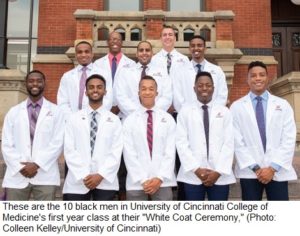
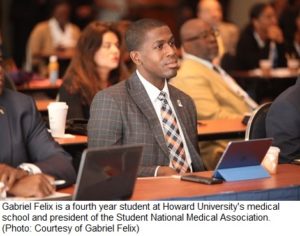
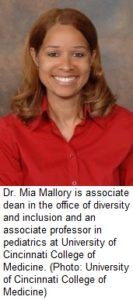 ► University of Cincinnati. The College of Medicine welcomed the largest group of African-American men in its history last year at 10 – an important milestone, given the gender gap within the few black doctors.
► University of Cincinnati. The College of Medicine welcomed the largest group of African-American men in its history last year at 10 – an important milestone, given the gender gap within the few black doctors. So you got a partner …
So you got a partner …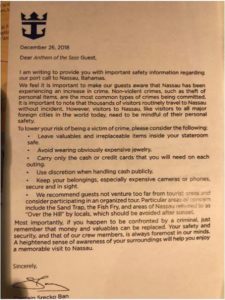
 A copy of Ban’s letter posted on various websites, dated Dec. 26, pointed out that the most common types of crimes are nonviolent, “such as theft of personal items,” and noted that “thousands of visitors routinely travel to Nassau without incident.”
A copy of Ban’s letter posted on various websites, dated Dec. 26, pointed out that the most common types of crimes are nonviolent, “such as theft of personal items,” and noted that “thousands of visitors routinely travel to Nassau without incident.”
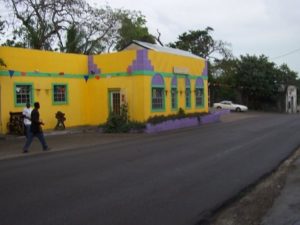


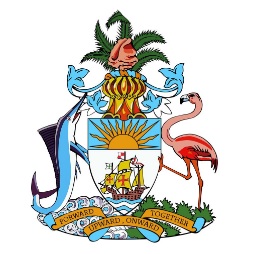
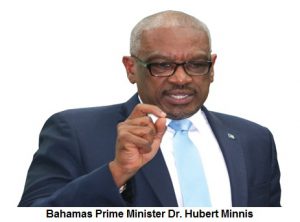 The Bahamas will maintain its stance against joining the Caribbean Single Market and Economy (CSME), despite increased pressure from certain regional heads to expand the initiative.
The Bahamas will maintain its stance against joining the Caribbean Single Market and Economy (CSME), despite increased pressure from certain regional heads to expand the initiative.







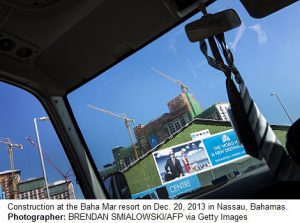
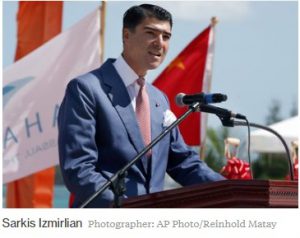 BML Properties Ltd
BML Properties Ltd